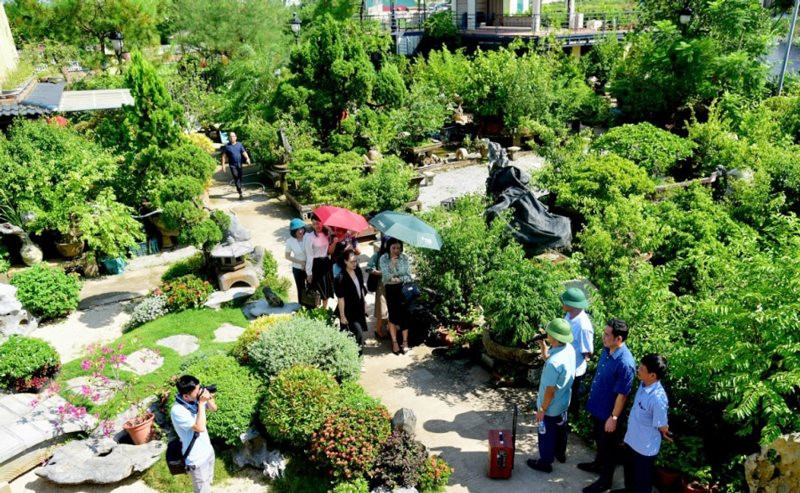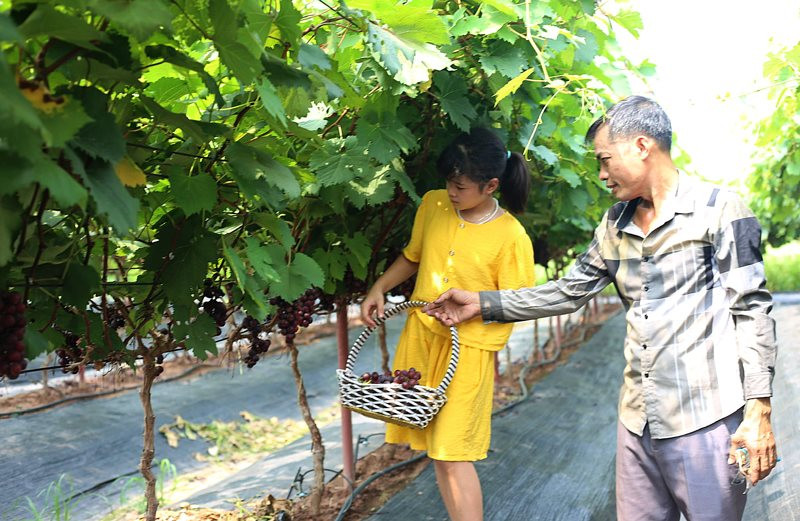Hanoi awakens riverside agrotourism potential
With a high potential for agritourism in 18 outlying districts, Hanoi has focused on tapping it to attract more visitors to rural areas.
Riding a tram through streets named after flowers, visiting flower gardens and farms, taking pictures of the vast fields of colorful flowers and fruits, enjoying local specialties, and listening to historical stories at relics are activities tourists can experience when they come to Hong Van Commune in Hanoi's outskirts of Thuong Tin District.
Taking advantage of its location along the Red River, Hong Van Commune, about 18 kilometers south of downtown Hanoi, has become an attractive ecotourism and agritourism destination in recent years. The commune has now built 21 main roads, named after the flowers planted along them.
Secretary of Hong Van Commune Party Committee Nguyen Hai Dang said the commune has nearly 20 ecotourism models related to green tourism and agritourism. "Every year, the number of visitors to the commune reaches 15,000 to 20,000, helping to maintain and create stable jobs for hundreds of workers with monthly incomes of about VND8 million (US$332) per person," Dang said.
Hong Van Commune in Thuong Tin District attracts many tourists with ecotourism models. Photo: Hoang Phuc |
In Dan Phuong District, about 20 km west of central Hanoi, many ecological farming models have been established along the riverbanks and are gradually becoming tourist destinations for Hanoi's visitors. A typical example is the grape growing model in Phuong Dinh, Dan Phuong, and Trung Chau communes.
Nguyen Huu Ky, a vineyard owner in Dan Phuong Commune, told local media that his grape variety has high economic value. In addition to growing grapes for sale, his family hosts travelers who come for sightseeing. Since the beginning of this year, the garden has welcomed nearly 200 visitors to take photos and learn from the model.
In addition to the model of combining grape growing with tourism, Dan Phuong has many other ecotourism and agrotourism models that have attracted tourists recently. Nguyen Thach Hung, Vice Chairman of the Dan Phuong District People's Committee, said that under the plan, village clusters along the Red River and the Day River will continue to practice traditional agriculture and develop ecotourism.
Sharing the perspective of Hanoi's agritourism development, Hoang Van Cuong, Vice Rector of the National Economics University (NEU), affirmed that the city's agriculture must be different from other places.
"Therefore, Hanoi needs a move to improve the urban agriculture model with high technology, experiential agriculture model combined with ecotourism, as the advantages of river routes and riverside communities are huge," Cuong said.
A local tourist picks black grapes at the Ha Den vineyard, a model of grape growing linked to agritourism in Hanoi's outskirts Dan Phuong District. Photo: Ngoc Anh/The Hanoi Times |
Maintaining the advantages
With the advantages of the terrain where rivers cross, Hanoi has strengths in organic farming, green agriculture, and resources to develop agritourism.
In Vietnam's tourism development strategy, ecotourism related to agriculture and rural areas is one of the five main products. The method of planning and developing these resources is being discussed at all levels and sectors in Hanoi to find the most effective solutions.
Specifically, the 100 kilometers of the Red River that flows through Hanoi has many mudflats and midlands that are strong points for building biological agritourism models. In addition to the Red River, there are many other rivers flowing through the city, including the Day River, Nhue River, and Tich River, which have untapped potential.
According to Deputy Director of Hanoi's Department of Agriculture and Rural Development Ta Van Tuong, the sector has made plans to focus on developing organic agritourism along the banks of the Red River, Day River, Duong River, with a natural area of about 29.4 thousand hectares; as well as protecting Hanoi's green belt.
Meanwhile, Deputy Chairman of Hanoi People's Committee Nguyen Manh Quyen stressed that Hanoi will issue a plan to develop agritourism in line with the construction of new-style rural areas in the city and policies to attract enterprises to invest in agricultural and rural tourism.
The Hanoi Department of Tourism has also drafted a plan to create favorable conditions for agricultural and rural economic development.
"With high potential for agritourism in 18 outlying districts, Hanoi has focused on promoting agritourism products to attract more visitors to rural areas and contribute to local socio-economic development. Thanks to ancient agricultural villages and a variety of local specialties, outlying districts such as Thuong Tin, Ung Hoa, Dong Anh, Soc Son, Thach That, and Ba Vi have attracted a large number of visitors so far," said Dang Huong Giang, Director of the Hanoi Department of Tourism.
She added that a number of educational farms and agritourism areas have been developed to meet the demand of visitors to explore and experience agricultural activities. The department has been in contact with craft and ancient villages to form attractive tours on the city's outskirts.
"We have worked with six districts of Thach That, Thuong Tin, Son Tay, My Duc, Dan Phuong, and Thanh Tri to evaluate their agritourism infrastructure and explore issues that need to be improved for agritourism development. In addition to strengthening communication on agritourism products and training on rural tourism, the sector will create an agritourism map to highlight areas with high potential in this field, thus creating an agritourism tour of the capital," Giang told local media.













